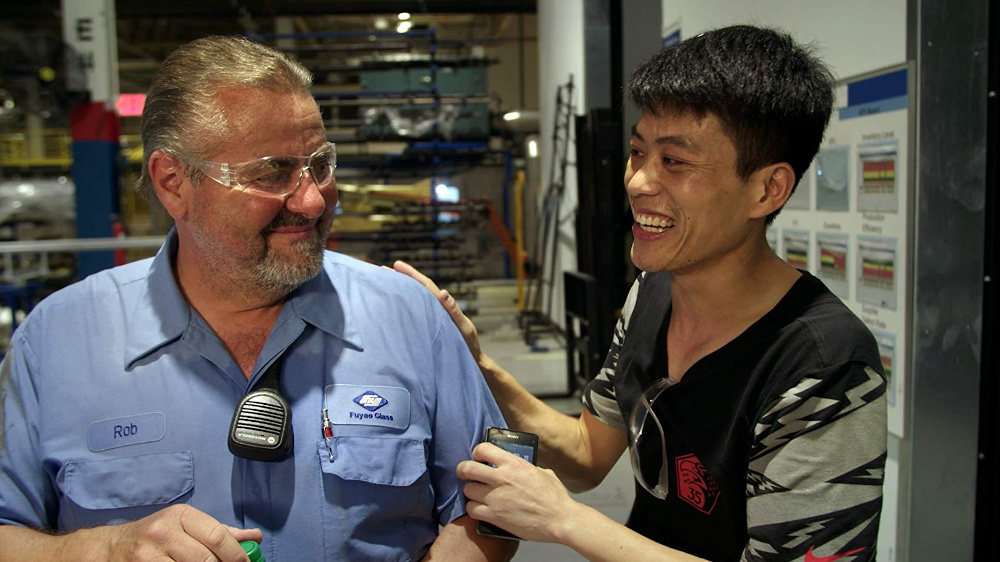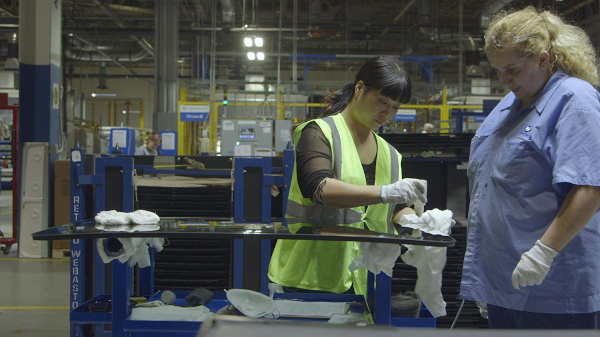Netflix's "American Factory" Reminds us Why it's Important to Consider What we Buy
This past Saturday, as I was headed home from lunch, I swatted at a mosquito on my car windshield (as you do, during a Southern summer). When I got over the frustration of missing, I looked up and saw, much to my dismay, that my blow had landed on a small nick in my windshield, causing it to expand into three long cracks and requiring a windshield replacement.
Car windshields are one of those things you never really think about until you have to. I had never considered the process or the people who made mine until that same evening when my husband suggested that we watch the new Netflix documentary, American Factory, about an automotive glass manufacturing factory in Dayton, Ohio.
American Factory follows the story of Chinese-owned company Fuyao Glass opening a factory in Dayton, Ohio in 2015. The film explores the complicated relationships between Chinese managers and their American employees as Fuyao sends in supervisors from their factories in China to train, oversee, and supervise American workers.
While the documentary explores the positive aspects of these relationships and the friendships that form across cultural lines, it also dives into the differences between Chinese and American workplace cultures. Fuyao supervisors are unaware of or resistant to some of the labor laws and safety regulations in the American workplace.
Many wonder why their American employees will not work on weekends and why they can’t meet their quotas without compromising quality and safety.
At one point, a Chinese supervisor asks his colleagues, “Can we force them to work overtime?”
The documentary compares this to Fuyao factory employees in China who generally work twelve hours a day (sometimes without breaks), in hazardous conditions, live in dormitories, get one or two days off a month, and only get off to see their families a few times a year. This commitment to work seems standard for them, as the Chairman of Fuyao Glass even reasons at the end,
“The point of living is to work. Don’t you think so?”
American Factory brings up a lot of thought-provoking questions and provides a great opportunity to dialogue about conscious consumerism. It explores some of the grey areas in labor issues and worker rights and causes us to deeply consider how to approach these issues.

Photo Credit: IMDB
An easy—but, I believe, inaccurate—takeaway would be that a US workplace environment and style of management is good or ethical, while a Chinese style is bad or unethical. This misses the point.
In watching the documentary, we begin to see and understand both American and Chinese employees of Fuyao. The film reveals general cultural differences, but the focus is more on how a wealthy company runs its businesses and treats its employees.
There are well-run and ethical companies all over the world who care about workplace conditions and the rights of their employees. But there are also companies all over the world who are driven by profit above all else and are willing to compromise the health, happiness, and freedom of their workers to achieve a better bottom line.
This should cause us, as consumers, to consider the part we play in this system.
It’s easy to call out the managers and CEOs who nickel and dime their employees and demand speed even at the expense of quality and worker rights, but do our shopping habits reflect these same unethical principles?
Through our purchasing decisions, do we reinforce the idea that we are willing to buy only the cheapest, most quickly-produced and readily-available items, even at the expense of the people who made them?

Photo credit: IMDB
Of course, we can’t examine every facet of every product we buy before we buy it. This would make us incapable of actually living our lives because we would be too busy researching. But we can become more conscious consumers and consider the fact that every product we buy has a history—that someone, somewhere made it.
I had never given much of a thought to my car windshield before, but now I find myself wondering if it’s a Fuyao product and picturing the faces of the people who made it. If I think about all the products I buy this way, it motivates me to shop ethically whenever it’s possible or practical.
That’s why DoneGood exists. We want to make buying ethical options as possible and as practical as it can be. That’s why we vet hundreds of brands to provide you with ones who care about their workers’ rights and are committed to doing good for people and the planet.
We want to communicate by the dollars that we spend that other people, their families, and the planet that we share are still more valuable than the bottom line.

Erin King
DoneGood Contributor
Writer, editor, and all-around language enthusiast who
uses her love of words to help others.
Website


Leave a comment